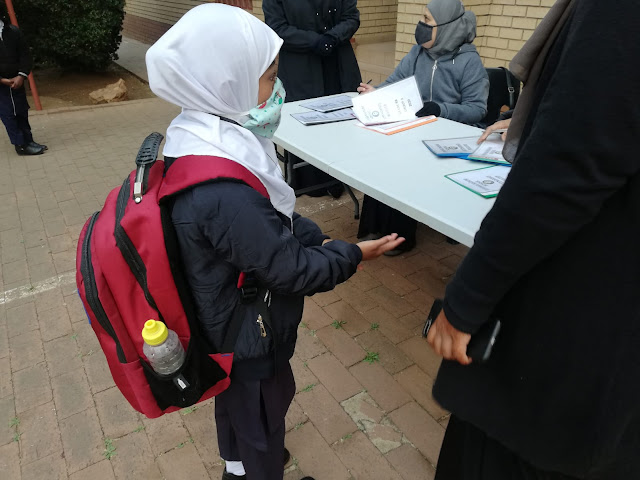 |
| Teachers welcoming back a student at Springs Muslim School, Ekurhuleni upon re-opening. |
For the teachers reading this, you know that you did not become a teacher for money or fame; and whether you consciously thought about it or not, you became a teacher because you would go on to make a difference in the world.
In the lead up to International Teachers’ Day on 5 October, now is the time to recognise the integral role which teachers play in society. “The positive impact of one rockstar teacher can ripple through a community and have a lasting impact on the children they teach,” comments George Eadie, CEO of The Answer Series (TAS).
Teaching really is a profession like no other, and it certainly hasn’t been easy in 2020. Nadia Anhuizen, Head of the Department English at Zeekoevlei High School comments,” As an administrative Head of Department, I have had to stand in for more senior staff members during their absence. The focus, to a great extent, has been on motivating educators and trying to keep the team positive during these challenging times.”
The average classroom teacher makes 1 500 educational decisions every school day – in a 6-hour school day that’s more than 4 decisions every minute! Habiel Adams, Commerce Head of Christel House South Africa, explains some of the additional challenges created around COVID-19:
“I soon noticed that the online classes [using Zoom and Microsoft teams] could not replace the physical class, particularly for active-learner engagement and for rapid fire question-and-answer techniques that are used to assess the understanding of concepts. With some learners, there were issues of submitting work and attendance. This became problematic as I now had less control than in the actual classroom at school. [There were also] issues with insufficient data and reception which affected the number of learners who could attend the digital classes.” This is not surprising as only 37% of South African households have consistent access to the internet, according to Statistics South Africa.*
Going back to school presented a new set of challenges too, “As the matrics were rephased back into school, one also had to adapt and adjust to the way in which one could interact with learners, as well as maintaining physical distance in class and hygiene (regular sanitisation of the hands and the compulsory wearing of face masks), and waiting a minimum of 4-5 days before scripts can be marked,” adds Adams.
On a positive note, teaching is one of the careers where you can see progress on a daily basis. When asked about her hopes for 2021, Anhuizen says, “We will take the lessons of 2020 and reinvent our teaching practices and our vision for schools. We need to become more savvy technologically. We hope for a smoother academic year with fewer disruptions. Hopefully we can also return to the playing fields soon.”
Adams emphasises how government and other role players need to come to the party too: “COVID-19 highlighted and further exposed the already existing inequality in our communities and schools, particularly in the context of access to resources, access to digital and electronic resources, and school staffing. The national government is now in a position to conduct an extensive SWOT analysis on the current context of education in South Africa and find proper ways of addressing all the challenges, weaknesses and threats in order to improve educational opportunities for all South African children.”
By providing free study guides to teachers, and video content to learners, TAS plays an integral role in addressing this inequality, and creating opportunities for learners. “Our vision is for teachers to have access to high quality resources, which they might not be aware of until they’ve experienced them. It’s the least we can do for the thankless and critical role that teachers play in our national effort,” comments Eadie.
“As a teacher you bring hope to learners. You bring encouragement. You allow learners to dream. And you reap the rewards of seeing young people grow into young adults.
We’d like to take this opportunity to acknowledge and sincerely thank all South African teachers – you’ve endured a lot in 2020 and are some of the great heroes to have come out of this pandemic,” concludes Eadie.
*Sourced from https://mg.co.za/opinion/2020-09-08-covid-19-exposes-south-africas-digital-literacy-divide/
Featured Advertiser: High Resolution Ad at this link

